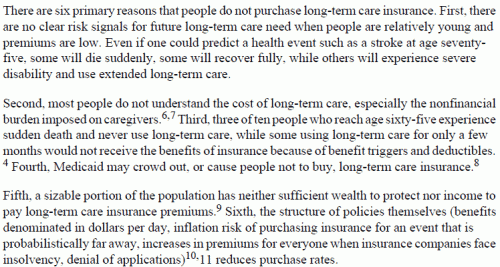Lots of reports that the CLASS provisions will fall in any Senate-driven budget deal. Even if that doesn’t come to pass, CLASS is likely to go in any negotiations to move ahead on health reform. Most of the focus is on how CLASS influences CBOs score of deficit reduction, but I want to focus on the problem that CLASS is designed to address, the need for and cost of Long Term Care (LTC). Because we cannot repeal disability.
CLASS was an attempt to set up a self sustaining LTC insurance program that would provide a relatively small amount of money per day ($50-$75) that could be thought of as cover to help people live in their homes with disability and perhaps keep them out of a nursing home. It is a partial response to what many would say is a failure of the private insurance market to cover LTC.
I wrote a paper in Health Affairs (I believe ungated here via NIH depository) with colleagues from Duke and Boston University that was in the January 2010 Health Affairs that looked at the viability of using genetic markers as risk adjustors for private LTC insurance. I don’t want to focus on the genetic piece, but the reasons people don’t purchase private LTC insurance:
The policy big picture is this.
- Families are the first line provider of LTC and this will always be the case. AARP estimates the value of such informal LTC to be $450 Billion per year.
- Medicaid is the default payer of nursing home care in the U.S., the most expensive setting for LTC and pays around half of all such care. You could think of Medicaid as a universal NH insurance program with the deductible being your wealth. NH and LTC generally are where the big money is for Medicaid programs.
- I suspect CLASS will eventually be goners. Do the repealers have any ideas about how to expand insurance coverage for LTC? We have had tax credits for LTC insurance for years….
- The private LTC insurance market is small and there are many good reasons people don’t buy such coverage, including the fact that 3 in 10 of those surviving to age 65 die without using such care. Amongst the users, there are tremendous variations in length of use and the amount of money needed to finance the longest stay is probably $1. 5 Million. So, almost everyone is at risk of being unable to pay for the LTC they could need.
- If ever there were a risk that called out for social insurance (broad spreading of premium in return for broad coverage) it is LTC. The policy answer is risk pooling and the private market has failed to do it. Medicaid certainly plays a crowd out role for NH coverage, but think through the 6 reasons for non purchase above; all of them must be addressed to move off of the status quo.
What is the answer? The population is aging….


